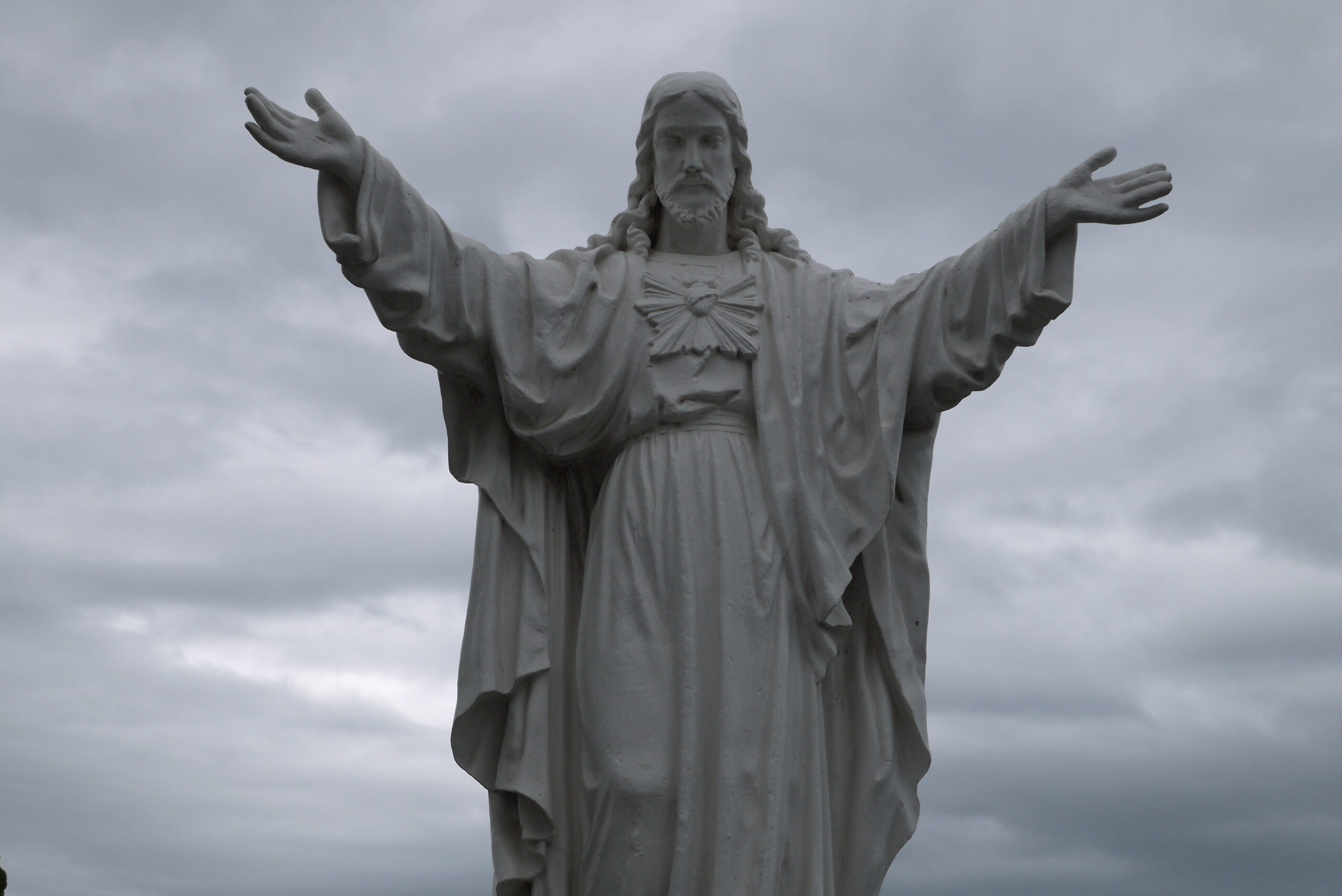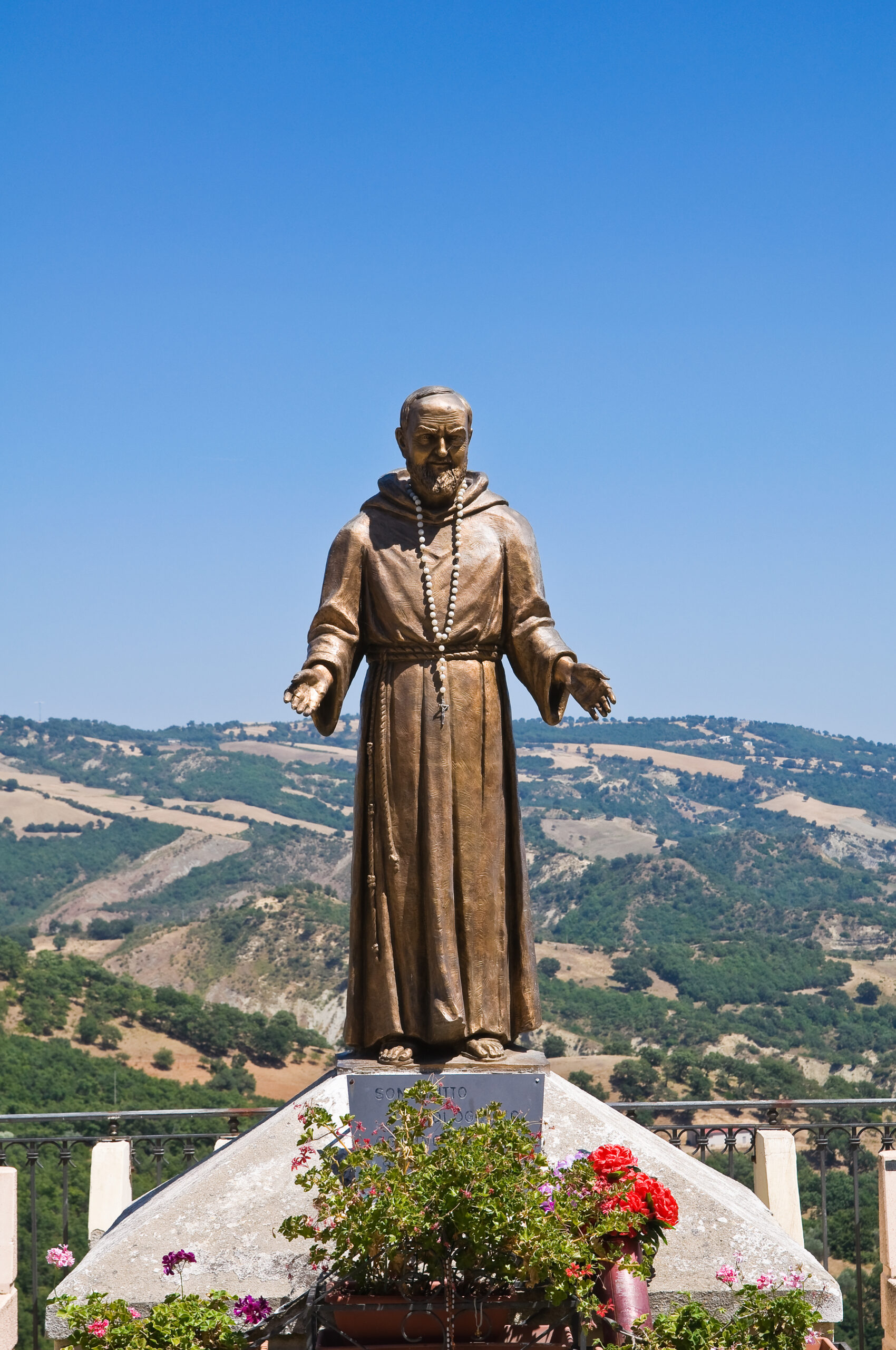It seems many of us don’t give angels a lot of thought. When we do think about them, we tend to think about them in either a childish way (“Angel of God, my guardian dear…”) or in a superstitious way (as evidenced by most books on angels found on the shelves of your local bookstore). Maybe the scant information about angels causes us to dismiss them as a quaint or useless fiction. But what is true?
Today we celebrate the Feast of Saints Michael, Gabriel, and Raphael, the three archangels mentioned in Scripture by name. Based on the Scriptural references, we actually know quite a bit about angels:
- they are created beings (Psalm 148:2-5)
- there are many, many angels (Daniel 7:10, Apocalypse 5:11, Psalm 67:18, Matthew 26:53)
- they are of a higher order than humans (Psalm 8:6)
- some of them turned against God and fell from grace (Genesis 3, 6, Apocalypse 9:11-15, 12:7-9, Luke 10:18)
- these evil angels tempt humans to destruction (Matt 25:42, 2 Peter 2:4, Ephesians 6:12, 2 Corinthians 11:14 and 12:7)
- they minister to God (Daniel 7:9-10; Tobit 12:15; Revelation 8:2-5)
- they minister to us (Job 1:6, 2:1; Matt 18:10; Hebrews 1:14)
- they are messengers to us (Judges 13, Daniel 8, Zechariah 1 ,2, 4, 5; Luke 2:9, etc.)
- they are personal guardians to us (Genesis 24:7, Psalm 33:8, Matthew 4:6, 18:19; Hosea 12:4, Acts 12:7)
- they are guardians of whole peoples (Exodus 14:19, Baruch 6:6, Daniel 10:12-21; Acts 16:9)
- there is a hierarchy of 9 orders of angels: Angels, Archangels, Virtues, Powers, Principalities, Dominations, Thrones, Cherubim, and Seraphim (Ezekiel 1, Isaias 6, 1 Thes 4:15, Ephesians 1:21, Colossians 1:16)
- the names of several archangels: Michael, Gabriel, Raphael (Daniel 8, 10:13, 12; Tobit 12:15, Luke 1:19, Apocalypse 12:7)
At every Mass, we join with the angels in praying the Gloria and the Holy, Holy, Holy. At funerals, we invoke their assistance for the deceased (“May the angels lead you to Paradise”). This compilation is not exhaustive, but it gives a good summary of what is true about angels: there are myriads of angels ministering before the Throne of God, and they are our fellow-creatures, friends, helpers, guides, defenders, and messengers.
We are each given an angel to be with us on our journey to the Heart of the eternal Father. He has given us each a companion to strengthen us in our weakness, keep our eyes open to God and His will, block for us every wrong way and point out the pitfalls the Enemy has set before us. In Heaven, we will rejoice with this companion forever before the Face of the Father!
So we can pray: Guardian Angel, guide and guard me. St. Gabriel and St. Raphael, watch over us. St. Michael, Friend of the friends of God, protect and defend us!
 Kathryn Mulderink, MA, is married to Robert, Station Manager for Holy Family Radio. Together they have seven children (including newly ordained Father Rob and seminarian Luke ;-), and two grandchildren. She is a Secular Discalced Carmelite and has published five books and many articles. Over the last 25 years, she has worked as a teacher, headmistress, catechist, Pastoral Associate, and DRE. Currently, she serves the Church as a writer and voice talent for Catholic Radio, by publishing and speaking, and by collaborating with the diocesan Office of Catechesis, various parishes, and other ministries to lead others to encounter Christ and engage their faith. Her website is https://www.kathryntherese.com/.
Kathryn Mulderink, MA, is married to Robert, Station Manager for Holy Family Radio. Together they have seven children (including newly ordained Father Rob and seminarian Luke ;-), and two grandchildren. She is a Secular Discalced Carmelite and has published five books and many articles. Over the last 25 years, she has worked as a teacher, headmistress, catechist, Pastoral Associate, and DRE. Currently, she serves the Church as a writer and voice talent for Catholic Radio, by publishing and speaking, and by collaborating with the diocesan Office of Catechesis, various parishes, and other ministries to lead others to encounter Christ and engage their faith. Her website is https://www.kathryntherese.com/.


 Nikol M. Jones is in her final year at Franciscan University’s Master’s in Theology and Christian Ministry program where it has been her joy to learn how to integrate the tools of modern biblical scholarship with the principles of biblical interpretation set forth by the Catholic Church in the service of the Word of God. She also has a passion for creating artwork and children’s books that honor the life and teachings of Christ. When she’s not studying or painting, she utilizes her writing and organizational skills as an administrative assistant. You can connect with her on LinkedIn at
Nikol M. Jones is in her final year at Franciscan University’s Master’s in Theology and Christian Ministry program where it has been her joy to learn how to integrate the tools of modern biblical scholarship with the principles of biblical interpretation set forth by the Catholic Church in the service of the Word of God. She also has a passion for creating artwork and children’s books that honor the life and teachings of Christ. When she’s not studying or painting, she utilizes her writing and organizational skills as an administrative assistant. You can connect with her on LinkedIn at 
 Tommy Shultz is Director of Evangelization for the North Allegan Catholic Collaborative and the founder of Rodzinka Ministries. In these roles, he is committed to bringing all those he meets into a deeper relationship with Christ. Tommy has a heart and a flair for inspiring people to live their faith every day. He has worked in various youth ministry, adult ministry, and diocesan roles. He has been a featured speaker at retreats and events across the country. His mission and drive have been especially inspired by St. John Paul II’s teachings. Tommy is blessed to be able to learn from the numerous parishes he visits and pass that experience on in his presentations. With a degree in Theology from Franciscan University, Tommy hopes to use his knowledge to help all people understand the beauty of The Faith.
Tommy Shultz is Director of Evangelization for the North Allegan Catholic Collaborative and the founder of Rodzinka Ministries. In these roles, he is committed to bringing all those he meets into a deeper relationship with Christ. Tommy has a heart and a flair for inspiring people to live their faith every day. He has worked in various youth ministry, adult ministry, and diocesan roles. He has been a featured speaker at retreats and events across the country. His mission and drive have been especially inspired by St. John Paul II’s teachings. Tommy is blessed to be able to learn from the numerous parishes he visits and pass that experience on in his presentations. With a degree in Theology from Franciscan University, Tommy hopes to use his knowledge to help all people understand the beauty of The Faith.
 Deacon Dan Schneider is a retired general manager of industrial distributors. He and his wife Vicki recently celebrated their 50th wedding anniversary. They are the parents of eight children and twenty-nine grandchildren. He has a degree in Family Life Education from Spring Arbor University. He was ordained a Permanent Deacon in 2002. He has a passion for working with engaged and married couples and his main ministry has been preparing couples for marriage.
Deacon Dan Schneider is a retired general manager of industrial distributors. He and his wife Vicki recently celebrated their 50th wedding anniversary. They are the parents of eight children and twenty-nine grandchildren. He has a degree in Family Life Education from Spring Arbor University. He was ordained a Permanent Deacon in 2002. He has a passion for working with engaged and married couples and his main ministry has been preparing couples for marriage.
 Beth Price is part of the customer care team at Diocesan. She brings a unique depth of experience to the group due to her time spent in education, parish ministries, sales and the service industry over the last 25 yrs. She is a practicing spiritual director as well as a
Beth Price is part of the customer care team at Diocesan. She brings a unique depth of experience to the group due to her time spent in education, parish ministries, sales and the service industry over the last 25 yrs. She is a practicing spiritual director as well as a 
 Kathryn James Hermes, FSP, is the author of the newly released title
Kathryn James Hermes, FSP, is the author of the newly released title
 Sheryl O’Connor delights in being the number 1 cheerleader and supporter for her husband, Tom who is a candidate for the Permanent Diaconate in the Diocese of Kalamazoo. They are so grateful for the opportunity to grow together in this process whether it is studying for classes, deepening their prayer life or discovering new ways to serve together. Sheryl’s day job is serving her community as the principal for St. Therese Catholic School in Wayland, Michigan. Since every time she thinks she gets life all figured out, she realizes just how far she has to go, St. Rita of Cascia is her go-to Saint for intercession and help. Home includes Brea, a Bernese Mountain dog and Carlyn, a very, very goofy Golden Retriever.
Sheryl O’Connor delights in being the number 1 cheerleader and supporter for her husband, Tom who is a candidate for the Permanent Diaconate in the Diocese of Kalamazoo. They are so grateful for the opportunity to grow together in this process whether it is studying for classes, deepening their prayer life or discovering new ways to serve together. Sheryl’s day job is serving her community as the principal for St. Therese Catholic School in Wayland, Michigan. Since every time she thinks she gets life all figured out, she realizes just how far she has to go, St. Rita of Cascia is her go-to Saint for intercession and help. Home includes Brea, a Bernese Mountain dog and Carlyn, a very, very goofy Golden Retriever.
 Erin is a Cleveland native and graduate of Franciscan University of Steubenville. Following graduation, she began volunteering in youth ministry at her home parish of Holy Family Church. Her first “big girl” job was in collegiate sports information where, after a busy two years in the profession on top of serving the youth, she took a leap of faith and followed the Lord’s call to full-time youth ministry at St. Peter Church. She still uses her communication arts degree as a freelance writer and statistician, though. You can catch her on old episodes of the Clarence & Peter Podcast on YouTube as well as follow her on Twitter @erinmadden2016.
Erin is a Cleveland native and graduate of Franciscan University of Steubenville. Following graduation, she began volunteering in youth ministry at her home parish of Holy Family Church. Her first “big girl” job was in collegiate sports information where, after a busy two years in the profession on top of serving the youth, she took a leap of faith and followed the Lord’s call to full-time youth ministry at St. Peter Church. She still uses her communication arts degree as a freelance writer and statistician, though. You can catch her on old episodes of the Clarence & Peter Podcast on YouTube as well as follow her on Twitter @erinmadden2016.
 Tami Urcia grew up in Western Michigan, a middle child in a large Catholic family. She spent early young adulthood as a missionary in Mexico, studying theology and philosophy, then worked and traveled extensively before finishing her Bachelor’s Degree in Western Kentucky. She loves tackling home improvement projects, finding fun ways to keep her four boys occupied, quiet conversation with the hubby and finding unique ways to love. She works at Diocesan, is a guest blogger on
Tami Urcia grew up in Western Michigan, a middle child in a large Catholic family. She spent early young adulthood as a missionary in Mexico, studying theology and philosophy, then worked and traveled extensively before finishing her Bachelor’s Degree in Western Kentucky. She loves tackling home improvement projects, finding fun ways to keep her four boys occupied, quiet conversation with the hubby and finding unique ways to love. She works at Diocesan, is a guest blogger on 
 Patrick produces YouTube content for young Catholics on
Patrick produces YouTube content for young Catholics on 
 Emily Jaminet is a Catholic author, speaker, radio personality, wife, and mother of seven children. She earned a bachelor’s degree in mental health and human services from the Franciscan University of Steubenville. She is the co-founder of
Emily Jaminet is a Catholic author, speaker, radio personality, wife, and mother of seven children. She earned a bachelor’s degree in mental health and human services from the Franciscan University of Steubenville. She is the co-founder of 
 Shannon Whitmore currently lives in northwestern Virginia with her husband, Andrew, and their two children, John and Felicity. When she is not caring for her children, Shannon enjoys writing for her blog, Love in the Little Things, reading fiction, and freelance writing. She has experience serving in the areas of youth ministry, religious education, sacramental preparation, and marriage enrichment.
Shannon Whitmore currently lives in northwestern Virginia with her husband, Andrew, and their two children, John and Felicity. When she is not caring for her children, Shannon enjoys writing for her blog, Love in the Little Things, reading fiction, and freelance writing. She has experience serving in the areas of youth ministry, religious education, sacramental preparation, and marriage enrichment.